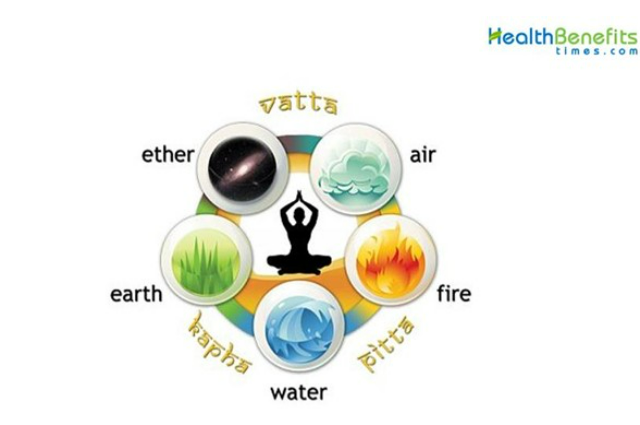
Image by Okan Caliskan from Pixabay
We may have often heard of words like Kapha, Pitta, Vata from our grandmother, or any other relatives. Whenever we feel discomfort in our own body, they say that it might be because of aggravation or imbalance of Kapha, pitta, or vata. They advise us to look for ayurvedic medicine to cure these imbalances, as our Ayurvedic tradition holds great power and wisdom to cure our bodies of illnesses.
Let's now understand these three forces one by one and how they lead to dysfunctions in our bodies. What can we do to keep their balance to keep ourselves healthy?
Our body is basically composed of five elements, namely, earth, water, fire, air, and ether. And our body functions are controlled by three forces formed by different combinations of these elements. The combination of earth and water elements is called as 'Kapha'. The fire and water combination is called 'Pitta' and 'Vata' is the combination of air and ether.

Let us now understand these forces and how to identify which force dominates within our bodies.
Understanding the nature of Kapha
Two third of planet earth is covered with water, and together with the element of earth, water forms the characteristics of Kapha. To understand this element, keep the features of earth in your mind, which is steady and slow in its movement.
Let's now look at how to identify if you have Kapha dominating body.
- Person with Kapha dominating force has a large bone structure, heavy muscles, and a tendency to gain weight fast.
- Their skin is moist, with a yellowish tone and oily texture.
- The shape of the head is round and big.
- Broad forehead, big nose, full lips, and large teeth.
- They have bushy eyelashes and eyebrows that make them attractive and lovable.
- These people have pleasant body odour and strong immune power.
- People with a Kapha nature are slow in their actions.
- Slow grasping capacity for information.
- Have a powerful memory for prior events but often forget present matters quickly.
- Their voice is heavy and they speak slowly.
- These people are good listeners.
- Have constant and steady sex drive throughout their life.
- They make successful careers in the caretaking field.
- They love cooking, gardening, decorating, and being in nature.
- They maintain strong and long-lasting relationships.
- Sleep deeply and hard time waking up.
- Sensitive to damp climates and tend to have respiratory-related issues in those weather conditions.
- Compared to the other two natures, Kapha dominants need a higher dosage of medicine for it to have an effect on their system.
Understanding the nature of Pitta
To understand the nature of Pitta, keep in mind the features of the sun. We love the warmth of the sun, but when it gets too close to us, we run to hide away from its heat. Now, think about the person with these qualities.
Here are the features of Pitta dominating person:
- Medium bone structure, tight muscles, and moderate weight.
- Warm and moist skin with a pinkish-red tone.
- Hair is soft and fine in texture and has the tendency to go grey early or bald.
- Medium-sized head with lines on the forehead.
- Medium nose, soft red lips, pink gums, and aligned teeth.
- Pitta people have the strongest appetite.
- Passionate and dominating in sex life.
- Proficient speaker with a confident voice.
- These people tend to be successful in scientific and business fields. And are interested in international affairs, news, politics, adventure, action sports, academia, organizing and leading groups, planning and starting new projects.
- They easily get infected with skin diseases such as eczema and Dandruff, as well as migraines and PMS.
- Due to high stress and anger, they get into arguments easily.
- They hold vengeful attitudes toward their enemies and act to destroy their enemies.
- These people are sensitive to heat and sun.
- Their dreams are mostly aggressive, about quarreling or conquering.
- Their body odour is strong.
- They have the tendency to get diarrhea.
- They require a normal dosage of medicine to heal their symptoms and disease.
Understanding the nature of vata
Think of a person who has characteristics similar to those of the moon, you'll find in them the dominant characters of vata. Here are the features:
- Below average body weight.
- Like to follow their own feeling rather than the rules.
- Enjoys traveling, seeks freedom, and loves diversity in all areas of life.
- They stay slim with sleek bone structure. Have difficulty gaining weight and have a tendency to lose weight.
- Coldness in body tissues such as cold hands and feet.
- Skin has a bluish brown tone, with a rough and dry texture.
- Structure of the face can be small with features such as firm eyelashes, uneven and charming teeth, sleek nose, lips, and chin.
- They don't sweat much and don't usually have any body odour.
- They have the habit of spending too much money without too much thought.
- They like social gatherings, traveling, parties, meeting new people, fun games, plays, music, poetry, and dance.
- These people tend to be artists.
- In their sex life, they hold strong desire in the mind but low energy in reality.
- They remember most things in the present, but easily forget the past.
- They often wake up during the night and have dreams such as falling from heights or flying in the sky.
- They mostly suffer from reproductive and nervous system diseases.
- They require a minimum dosage of medicine to cure disease.
Now, after understanding which element dominates in your body, let us now look at how to identify if there is an imbalance of these elements in your body.
Signs of Kapha imbalance
In the state of Kapha imbalance, the body sweats more profoundly and the tone of the sclera becomes yellowish and dull. It manifests in infections and diseases in the upper part of the body, such as obesity, breathing problem, throat congestion, and sinusitis.
Extra tiredness in the morning is also a symptom of too much Kapha in the body. Tonsillitis and feeling of heaviness in the body and mind are symptoms of excessive Kapha.
The person having excess Kapha becomes lazy, melancholic, sentimental, and depressed or has a desire to lead a materialistic life.
Aggravated levels of Kapha for a long time can cause you to feel tired even after long hours of sleep. It can also lead to heart disease, and slow functioning of the immune system which causes asthma, allergies, and other respiratory infections and disease.
Excessive Kapha leads the mind to depressive thoughts and self Hatred. A complete loss of control over food and drink and addiction to unhealthy habits and immoral activities.
Signs of Pitta imbalance

Symptoms of aggravated pitta normally can be felt by the middle part of the body. It attacks digestive system functions, including the stomach, pancreas, liver, spleen, and small intestine.
Excessive acidity in the stomach, a burning sensation in the oesophagus and eyes, skin-related issues such as eczema, dandruff, psoriasis, and headache are the initial symptoms of the irritated pitta force.
As excessive pitta attacks the digestive system, shallow breathing or inflammatory pain in the lumbar region can be the beginning stage of Pitta vikruti.
Low blood pressure, constipation or diarrhea, irritation in the eyes, and redness in the sclera are also the symptoms of initial pitta aggravation.
Heightened pitta disturbs the smooth functioning of the mind which leads to overambition, irritation, anger, and stress issues.
The person with a heightened Kapha often shows the signs of restlessness, impatience, and unhappiness. They become demanding, dominating, egoistic, manipulative, controlling, aggressive, or critical.
People in the heightened state of Pitta often work extra hard to make everything perfect but they're not usually satisfied with the final results.
When pitta vikruti remains in the body for a longer period of time, it creates the risk of getting ulcers, migraines, tinnitus, eye power variations, and thyroid gland enlargement. In long run, it leads to cancer in the stomach, liver, and pancreas.
Signs of Vata imbalance

Excessive vata normally manifests itself in the lower part of the body where reproductive organs and excretion channels are located. Urinary infections and lower back pain are early signs of Vata vikruti.
During the heightened Vata period, sleep tends to become light and interrupted and affected by fearful dreams. Person experiences disturbed focus, poor memory, lack of confidence, and feeling of extra tiredness.
The person becomes anxious, unreliable, judgemental, self-critical, or talks out of control.
If someone ignored these symptoms for a long time, it forces the person into deep anxiety, hopelessness, or feeling lost in the life path. The person might start to have self-pitying or self-punishing attitudes and there's always a lack of trust. This can be seen in a person's speech when they interact.
If remain untreated for a longer period, it leads to issues in reproductive organs such as prostate, menstrual disorder, nervous disorder, or miscarriages.
How to treat these elemental imbalances and stay healthy

To cure any illness, be it of imbalance of Kapha, pitta, or Vara, the prime suggestions would remain the same. They are as follows;
- Nourish your body with the physical food suitable for it. And avoid having foods that aggravate the element present in your body. To find which food comes in which category, you could simply search that on google as putting the whole list here would be a hectic and long task.
- Provide your body with nourishing mental food like good and positive thoughts, and encouraging words. Just like, the brain is the virtual mouth of our mind, the thoughts we process are the virtual food of our mind.
- Exercise regularly. Include yoga, and aerobics into your daily routine. Go for a walk in nature for at least 20 minutes both in the morning and evening.
- Meditate and give your mind some time to focus and to take rest from its restless talkings.
- Shop smartly. Be careful of what are you putting in your meal basket. Avoid using packaged food and start having fresh food cooked in the home.
- Avoid intoxicant addiction.
Conclusion:
Well, fitness and health always take time and effort. So, maintaining the elemental balance of your body will also be not an easy task. But once you've restored it, you'll see amazing and eye-soothing changes in yourself and your body, in the
way you work, you communicate, or any other thing.
Maintaining the balance between different elements in your body is the key to staying healthy, thinking healthy, and behaving healthily.
Our Ayurveda is the richest tradition in the field of medicine. We just need to unearth the treasure that it holds within us and apply that knowledge to our day-to-day life. That will be the biggest victory, not for ourselves or our health or our country, but for the founders of Ayurveda themselves who have compiled this knowledge for the generations to come, for their good.
Reference:
Boost Your immune power with Ayurveda by Janesh Vaidya.

